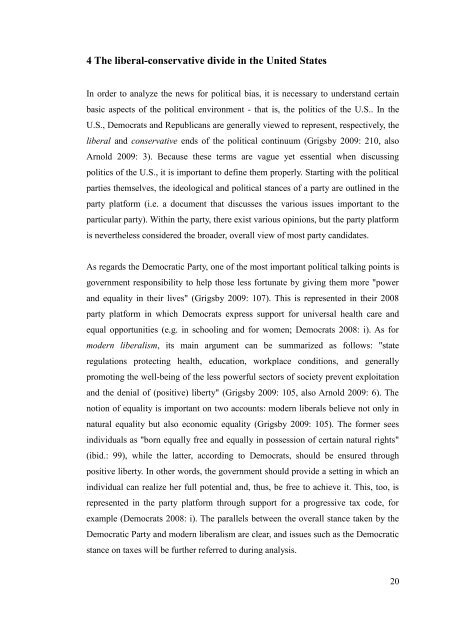Political Bias on BBC, CNN, and Fox News - Doria
Political Bias on BBC, CNN, and Fox News - Doria
Political Bias on BBC, CNN, and Fox News - Doria
Create successful ePaper yourself
Turn your PDF publications into a flip-book with our unique Google optimized e-Paper software.
4 The liberal-c<strong>on</strong>servative divide in the United States<br />
In order to analyze the news for political bias, it is necessary to underst<strong>and</strong> certain<br />
basic aspects of the political envir<strong>on</strong>ment - that is, the politics of the U.S.. In the<br />
U.S., Democrats <strong>and</strong> Republicans are generally viewed to represent, respectively, the<br />
liberal <strong>and</strong> c<strong>on</strong>servative ends of the political c<strong>on</strong>tinuum (Grigsby 2009: 210, also<br />
Arnold 2009: 3). Because these terms are vague yet essential when discussing<br />
politics of the U.S., it is important to define them properly. Starting with the political<br />
parties themselves, the ideological <strong>and</strong> political stances of a party are outlined in the<br />
party platform (i.e. a document that discusses the various issues important to the<br />
particular party). Within the party, there exist various opini<strong>on</strong>s, but the party platform<br />
is nevertheless c<strong>on</strong>sidered the broader, overall view of most party c<strong>and</strong>idates.<br />
As regards the Democratic Party, <strong>on</strong>e of the most important political talking points is<br />
government resp<strong>on</strong>sibility to help those less fortunate by giving them more "power<br />
<strong>and</strong> equality in their lives" (Grigsby 2009: 107). This is represented in their 2008<br />
party platform in which Democrats express support for universal health care <strong>and</strong><br />
equal opportunities (e.g. in schooling <strong>and</strong> for women; Democrats 2008: i). As for<br />
modern liberalism, its main argument can be summarized as follows: "state<br />
regulati<strong>on</strong>s protecting health, educati<strong>on</strong>, workplace c<strong>on</strong>diti<strong>on</strong>s, <strong>and</strong> generally<br />
promoting the well-being of the less powerful sectors of society prevent exploitati<strong>on</strong><br />
<strong>and</strong> the denial of (positive) liberty" (Grigsby 2009: 105, also Arnold 2009: 6). The<br />
noti<strong>on</strong> of equality is important <strong>on</strong> two accounts: modern liberals believe not <strong>on</strong>ly in<br />
natural equality but also ec<strong>on</strong>omic equality (Grigsby 2009: 105). The former sees<br />
individuals as "born equally free <strong>and</strong> equally in possessi<strong>on</strong> of certain natural rights"<br />
(ibid.: 99), while the latter, according to Democrats, should be ensured through<br />
positive liberty. In other words, the government should provide a setting in which an<br />
individual can realize her full potential <strong>and</strong>, thus, be free to achieve it. This, too, is<br />
represented in the party platform through support for a progressive tax code, for<br />
example (Democrats 2008: i). The parallels between the overall stance taken by the<br />
Democratic Party <strong>and</strong> modern liberalism are clear, <strong>and</strong> issues such as the Democratic<br />
stance <strong>on</strong> taxes will be further referred to during analysis.<br />
20

















